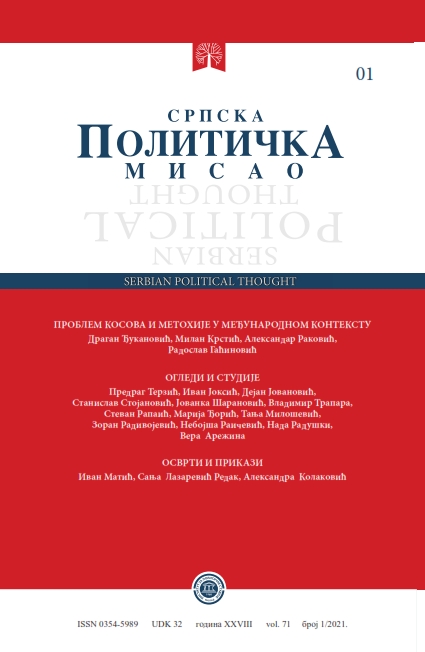ПРЕДСЕДНИЧКА КРИЗА У ВЕНЕЦУЕЛИ: УЗРОЦИ, АКТЕРИ И ПЕРСПЕКТИВЕ
VENEZUELAN PRESIDENTIAL CRISIS: CAUSES, ACTORS, AND PROSPECTS
Author(s): Vladimir TraparaSubject(s): Politics / Political Sciences
Published by: Институт за политичке студије
Keywords: chavism;oil;presidential crisis; Venezuela;United States;
Summary/Abstract: Year 2019 brought peculiar situation to a small Latin American state of Venezuela. A legally elected president Nicolas Maduro governs the state, while more than 50 countries in the world – including the United States and most of Venezuelan Latin American neighbours – recognize Juan Guaido as such. In this paper, causes, actors and prospects of Venezuelan presidential crisis are analyzed. Among the causes, several are identified: Hugo Chavez’s death in 2013; a sharp drop in oil prices in 2014; Venezuelan opposition huge victory in parliamentary elections 2015; election of Donald Trump for U.S. president in 2016; a wave of right-wing forces ascendance to power in Latin American countries during last few years. Besides chavista regime and the opposition, main actors in Venezuelan crisis are foreign – the U.S. and Venezuela’s neighbours who oppose the regime, and Cuba, Russia, China and a few other states who support it. Among possible prospects are four scenarios: U.S. military intervention; regime change by opposition action or coup; indefinite stalemate; negotiated agreement between the regime and the opposition.The analysis of Venezuela’s modern and contemporary history uncovers that oil is not only the main product of its economy, but essential part of its society, identity, and politics. Many governments used oil revenues for domestic social programs and active foreign policy, but failed to manage oil production properly, condemning the country to economic crisis and political turmoil once the oil price in world market went down. This is how two-party system and good relations with the United States from the second half of the 20st century collapsed, giving way to Hugo Chavez’s socialism and crusading all over the region against U.S. hegemony. However, Chavez repeated his predecessors’ mistake and used revenues from inadequately managed oil to support his ideological project. The result was inevitable and relatively fast path to a new crisis after his death, when the aforementioned factors coincided to make the crisis sharper than ever. However, the crisis has not yet brought the chavista regime down, given its control over Venezuelan army and support by Cuba and Russia. As coronavirus pandemic struck the world in 2020, third scenario – an indefinite stalemate seems the most likely.
Journal: Српска политичка мисао
- Issue Year: 2021
- Issue No: 1
- Page Range: 145-167
- Page Count: 23
- Language: Serbian

